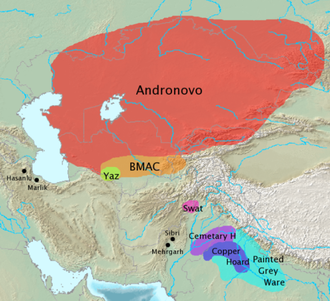Vedic period
Historical period in the Indian subcontinent
The Vedic period (c. 1500 – c. 500 BCE) is the period in the history of the Indian subcontinent during which the Vedas, the oldest scriptures of Hinduism, were composed. This period is significant for the development of the Indo-Aryan languages and the establishment of the Vedic religion.
Historical Context
The Vedic period is traditionally divided into the Early Vedic period (c. 1500 – c. 1000 BCE) and the Later Vedic period (c. 1000 – c. 500 BCE). The Indo-Aryan migration theory suggests that the Indo-Aryans migrated into the Indian subcontinent from the northwest, bringing with them the Indo-European languages and the Vedic culture.
Vedic Texts
The primary texts of this period are the Rigveda, Samaveda, Yajurveda, and Atharvaveda. These texts are composed in Vedic Sanskrit and form the basis of the Vedic religion. The Rigveda is the oldest of these texts and consists of hymns dedicated to various deities.
Society and Culture
The Vedic society was organized into tribes, each led by a chieftain known as a Raja. The society was patriarchal and stratified into various classes, including the Brahmins (priests), Kshatriyas (warriors), Vaishyas (traders), and Shudras (servants).
Religion
The Vedic religion was polytheistic, with deities such as Indra, Agni, and Soma being prominent. Rituals and sacrifices were central to the religion, and the Brahmins played a key role in conducting these ceremonies.
Economy
The economy during the Vedic period was primarily agrarian, with cattle being a major form of wealth. Trade and commerce were also present, with evidence of long-distance trade with other regions.
Material Culture
The material culture of the Vedic period is characterized by the use of Painted Grey Ware pottery, which is associated with the later Vedic period. The use of iron tools and weapons became prevalent during this time.
Funerary Practices
The Vedic people practiced both burial and cremation. Cremation became more common in the later Vedic period, as evidenced by archaeological finds.
Philosophy and Thought
The Vedic period laid the foundation for Indian philosophy, with the development of concepts such as Dharma, Karma, and Moksha. The Upanishads, composed towards the end of the Vedic period, explore these philosophical ideas in depth.
Related Pages
Transform your life with W8MD's budget GLP-1 injections from $125.
W8MD offers a medical weight loss program to lose weight in Philadelphia. Our physician-supervised medical weight loss provides:
- Most insurances accepted or discounted self-pay rates. We will obtain insurance prior authorizations if needed.
- Generic GLP1 weight loss injections from $125 for the starting dose.
- Also offer prescription weight loss medications including Phentermine, Qsymia, Diethylpropion, Contrave etc.
NYC weight loss doctor appointments
Start your NYC weight loss journey today at our NYC medical weight loss and Philadelphia medical weight loss clinics.
- Call 718-946-5500 to lose weight in NYC or for medical weight loss in Philadelphia 215-676-2334.
- Tags:NYC medical weight loss, Philadelphia lose weight Zepbound NYC, Budget GLP1 weight loss injections, Wegovy Philadelphia, Wegovy NYC, Philadelphia medical weight loss, Brookly weight loss and Wegovy NYC
|
WikiMD's Wellness Encyclopedia |
| Let Food Be Thy Medicine Medicine Thy Food - Hippocrates |
Medical Disclaimer: WikiMD is not a substitute for professional medical advice. The information on WikiMD is provided as an information resource only, may be incorrect, outdated or misleading, and is not to be used or relied on for any diagnostic or treatment purposes. Please consult your health care provider before making any healthcare decisions or for guidance about a specific medical condition. WikiMD expressly disclaims responsibility, and shall have no liability, for any damages, loss, injury, or liability whatsoever suffered as a result of your reliance on the information contained in this site. By visiting this site you agree to the foregoing terms and conditions, which may from time to time be changed or supplemented by WikiMD. If you do not agree to the foregoing terms and conditions, you should not enter or use this site. See full disclaimer.
Credits:Most images are courtesy of Wikimedia commons, and templates, categories Wikipedia, licensed under CC BY SA or similar.
Contributors: Prab R. Tumpati, MD






